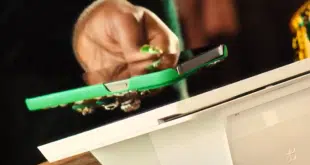Payments-industry observers who have been frustrated by the slow progress of near-field communication (NFC) technology for point-of-sale mobile payments may find an alternative in a new mobile application called MobilePay USA. The service surfaced last week when it won an award at a conference sponsored by TechCrunch, a technology blog. “We’ve been completely stealth,” Randy Smith, chief executive of Universal Commerce Inc., the Aliso Viejo, Calif-based company that offers MobilePay USA, tells Digital Transactions News.
With MobilePay USA, a consumer who’s ready to check out in a participating store can have the store appear on his phone via geo-location. The customer touches a “pay store” button, enters a four-digit PIN and the amount to pay, and then confirms the transaction by touching a “pay now” button. The authorization appears simultaneously on the phone as well as on the merchant’s point-of-sale terminal, and transactions are charged to credit, debit, or loyalty card accounts that are not stored on the phone. Unlike with NFC, merchants are not required to install contactless readers or other software and consumers do not need special wallet software on their phones.
So far, MobilePay works on the Apple iPhone, but the company plans to introduce apps for Google Inc.’s fast-growing Android operating system as well as for BlackBerry. The apps are downloadable and free to the consumer.
Smith, who is also the inventor of MobilePay USA, says the service should be in full release by early next year. He says the company is seeking independent sales organizations to help sell the service to merchants, which would be expected to pay a fee of 1% plus 25 cents per transaction on top of ordinary discount fees, though Smith says the fee can slide down depending on volume. Since the app’s debut at the TechCrunch event, “we have had at least a dozen phone calls from major acquirers and ISOs,” says Smith, who adds the company is in the final stages of setting up an ISO program to recruit small merchants. Large merchants appear to be interested, too. More than 50 “independent merchant brands” have contacted the company since last week, Smith says.
Merchant interest could stem as much from the technology’s marketing potential as from its ability to handle proximity payments without the need to buy and install contactless or bar-code gear. MobilePay USA also allows users to track loyalty and rewards points for specific merchants in real time on their phones. And Smith says his goal is to introduce a capability that would serve up offers for specific merchants on the phone as soon as the user enters a store, using geo-location technology. “That’s where the real value comes in,” he says.
“Merchants are hungry for alternatives, and they like rewards and loyalty,” agrees George Peabody, director of the emerging technologies advisory service at Mercator Advisory Group, Maynard, Mass. Still, recruiting merchants could be a hard slog, he warns. “There’s certainly some kind of willingness to consider [MobilePay USA],” he says, referring to the long-delayed debut of NFC. “But the acquiring problem is no small challenge. It’s the blocking and tackling of convincing merchants they want to do this.” A related problem is signing up consumers, since most merchants will show little interest until they see significant consumer coverage, he adds.
Smith, who started out with a concept for a so-called universal loyalty card that would work at any merchant terminal, shifted gears when it became apparent that payments with mobile phones were likely to gain consumer acceptance. Converting his loyalty technology to mobile, he says, was “not too difficult.” He founded his company only in May, and now has a head count of 10, though he expects that number to double by the end of the month. As for funding, he says his company is well-positioned. “We don’t need to make a ton of money in the first six months of 2011,” he says.





